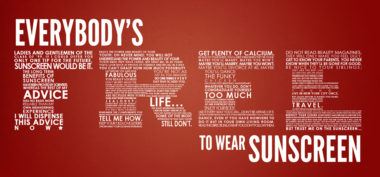Think back to 1999, those of you who were born then. (God, it pains me to say that.)
One of the top songs was by a movie director named Baz Luhrman. It was called “Everybody’s Free (To Wear Sunscreen)” – The entire song was the essay “Advice, like youth, probably just wasted on the young,” put to music. The original essay was written by Mary Schmich, and published in the Chicago Tribune as a column in 1997. It was NOT a commencement speech by Kurt Vonnegut, despite what the popular urban legend would have you believe.
That said, I was Amtrak Acela’ing it back from DC to NYC a few weeks
A good portion of the essay in the song involves change – either thinking change will never come, freaking out if change blindsides you (at 4pm on some random Tuesday,) or how you should respond when it inevitably does come.
The key takeaway is this: Change will come, and there’s only one effective response when it does, whether you’re a person or a business: Intelligently Adapt. Any other reaction to change is an eventual death sentence.
So here you go: Five easy ways to adapt to change that won’t freak out, destroy, or screw up your entire company, and leave you in a much better place:
Listen – The companies who adapt to change the best are the ones who are never surprised by it. How do they stay calm? They see it coming – not all of it, but they see small things happening differently and recognize that it could be part of something bigger. A client for whom I still consult had spent a ton of cash back in the day building out their MySpace presence, but always kept their ears to the ground. In one meeting I was in with them, they asked me if I’d heard of this “college only” thing called “FaceBook.” I said I had, and it was gaining traction. They kept working on their MySpace page, but also kept their eye on this newcomer. When Facebook opened to the masses, my client was one of the first companies to embrace it. They now have a tremendously popular FB fan page, and are generating a decent amount of revenue as well as new customers from it. Lesson: Never assume that the current “big thing” will always be so, because inevitably, it won’t.
Remember that nothing lasts forever – My first consulting gig after I left America Online was with a traditional print magazine. The day we signed my consulting contract, the first question the publisher asked was “so you worked at AOL – Will they be around in five years?” I answered honestly: “Yeah, they probably will – But will they be as powerful as they are now? I didn’t answer my own question – The point was, five years before that day, the fax machine was the communication method of choice. The publisher understood what I meant, and started investigating building a basic website, outside of AOL. As such, his publication was one of the first to have a solid web presence, which led to a massive increase in advertisers and ad sales. Lesson: There’s always something better just around the corner – Investigate anything you hear about – Maybe it’s nothing, but maybe it’s the next big thing. Don’t be caught with your pants down when some little thing becomes huge overnight.
But, “Latest Flashy Thing” doesn’t guarantee success – Keep your eyes on what new thing is coming down the pike, but don’t be so blinded that you jump right in without doing your homework: The story goes of a company who had a CTO who was so impressed with what the latest version of Shockwave (Flash) could do (yes, this was many years ago,) that he ordered the entire site to be rebuilt in Flash. It didn’t take too long after this for customers to revolt – the old way worked just fine, without constant bugs – This change meant the company’s oldest and most loyal customers were jumping ship. The CTO’s “ooh, ahh!” mentality cost the company a lot.
Unless it’s beneficial to the bottom line, don’t rush to do it – You have any idea how many clients came to my PR firm from 1998-2001 asking us to rebrand them so their new name ended in “.com?” No other reason – Just because everyone else was doing it – We tried to explain that just because you have a website doesn’t mean your 65-year-old company should now have a .com at the end. Some clients got it – some didn’t. In the end, the scales tip well towards the ones who waited the craze out – and focused on good ideas that proved to generate revenue, as opposed to the flash-in-the-pan ideas that “everyone else was doing.” Fast forward to today: Has a boss recently told you to “make something viral,” or “create one of those Snap-mobs I saw on TV…” Yeah. Same thing.
Finally, trust your gut. You’ve been marketing your business for a while, doing things you believe work, and getting proven results from them. Remember that whenever the next “sure thing!” comes along – Chances are, the ideas you’ve been doing, the ones your gut agrees with, will long outlive the next sure thing, each and every time.


Great post. I think that change and always staying ahead of the curve with new ideas and innovation is what will keep companies thriving. Really enjoy all of your insights! Keep ’em coming!